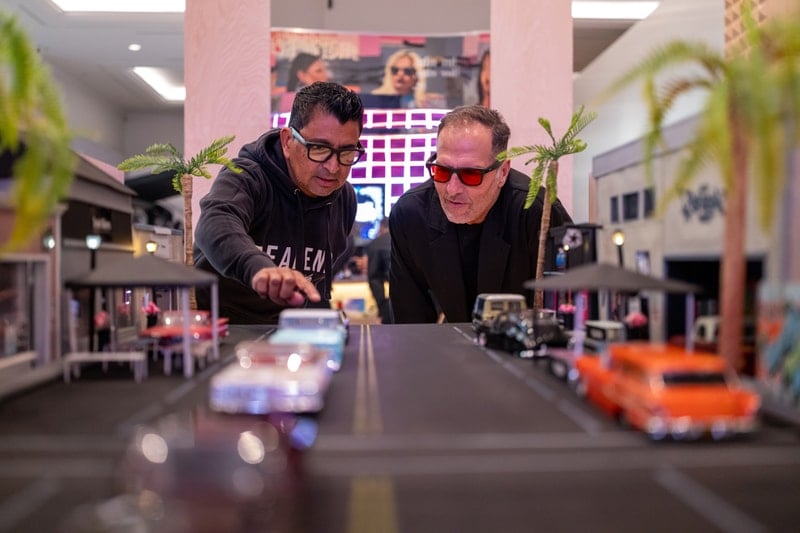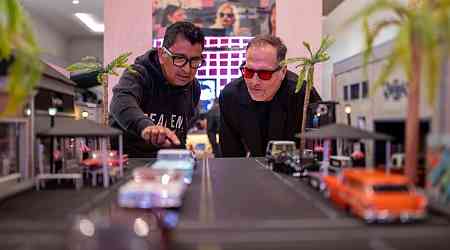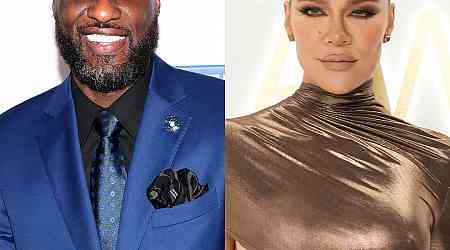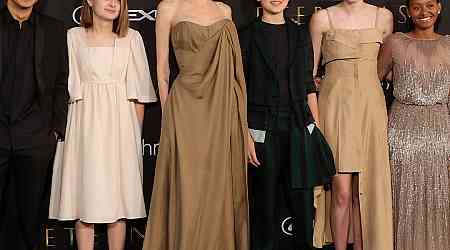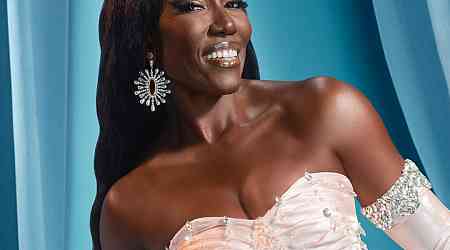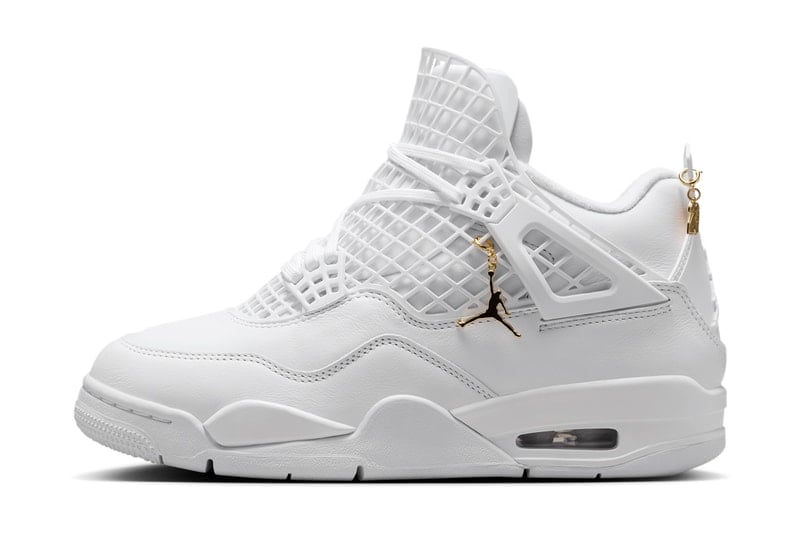Meta Lab, located on Los Angeles' Melrose Ave., opened its doors to the public on November 8, setting a disruptive precedent for the future of wearable tech. Its vibrant blue facade features a pair of iconic Ray-Ban Meta Wayfarers, a bright LED light winking just outside its arched doors. Inside, gorgeous 17-foot Malibu-inspired palm trees, bespoke millwork paired with machined aluminum surfaces and AI-generated cotton candy-hued artworks nod to California’s idyllic beaches. Ray-Ban's latest portfolio of tech-infused eyewear informs this forward-thinking spaciality, which aims to mirror the limitless wonders of AI. Hypebeast snagged an invite to Meta Lab’s recent launch party, featuring a special music set by DJ. Pee.Wee. (Anderson .Paak), and had the chance to sit down in conversation with Matt Jacobson, Vice President and Creative Director for Augmented Reality at Meta, to dive into the magic of experiential retail, the future of wearable tech and fostering spaces for subcultures to flourish.
The concept space offers an elevated, optimistic browsing experience and an opportunity to interact with Ray-Ban Meta glasses in a contemporary environment, inviting impromptu creation while reimagining the constraints of retail. Collaborating with model makers Armando Flores and celebrated photographer Estevan Oriol at Meta Connect 2024 earlier in September, Meta Lab reunites with these local visionaries and more to infuse the LA flagship with the breath of counterculture.





“This product needs to be tried and tested in a place where you can exercise all of its capabilities — not to just capture and listen, but to experience its AI features. Lowrider culture is [endemic] to the city and is having a huge moment right now, and customization is a big part of what happens in this space,” says Matt Jacobson. Custom culture at Meta Lab, then, aspires for a similar communal exchange. “You can take your Ray-Ban Meta case and engrave it in a way that pays homage to traditional tattooing. You can pick lowrider-themed images, your initials, and Southern California artworks. It's a way to make Ray-Ban Meta glasses your own, aside from the customization you can do with frame colors and lens designs.”
Paired with Meta Lab’s dopamine-inducing AI walls, which feature educational references about the artists platformed throughout the space, customers can capture and create content on the fly. A mixed-media mural by Jacqueline Valenzuela entitled IT’S HER RIDE ornaments one of the main walls, brazenly repping the women of lowrider culture. There’s Bounce Boulevard, a custom-built arcade game created in partnership with lowrider RC craftsman, Erick Padilla, where you can test the aerodynamics of a 1/10th scale lowrider. And the 1/24th scale of the infamous cruising street Whittier Boulevard, custom-designed by Armando Flores, delivers a slice of Southern California to cut the glossy patina of in-person shopping.










“We're a community-based company. That's what makes Instagram and Facebook interesting for people and why they love it. So why not create a community space that combines online and offline worlds? The first phase will be car culture, and then we’ll flip the space to DIY style, which encompasses upcycling, thrift and vintage culture. It’s exploring the most authentic expression of what we do at Meta and being [thoughtful] about the partners we choose to bring this space to life with.”
Until its close in December, Meta Lab will sustain this energy with a slew of recreational and educational programming: a DIY upcycling workshop held in partnership with rapper/singer Tierra Whack, a cooking class led by Cassie Yeung, a standup comedy set with Desi Banks and more.
“There's something magical about being in the space. These amazing displays of every version of our Ray-Ban Meta glasses — every frame option, every lens option — exist in the same gallery featuring Estevan Oriol's work from an upcoming book on lowrider culture. The gallery resembles his garage, with iconic images from the UK, the EU, South America, Australia, Japan, places where lowrider is thriving,” Jacobson notes. “That’s directly related to the learning journey we want consumers to have with our AI features.”





By acquiring Oculus in 2014, Meta has been at the forefront of driving connectivity through VR; now, with AI, Meta leads yet another facet of rapid-developing technology enhancing how we connect with the world. Ray-Ban Meta glasses offer a reinvention of eyewear centered on the day-to-day practicality of AI. An alternative replacement for mainstream earbuds and headphones, an inconspicuous instant camera for tourists and unabashed content creators, a chic accessory offering AI-powered utility — Ray-Ban Meta glasses are so good at what they do it's almost criminal that you can simply wear them as the chic Wayfarers, Skylers and Headliners you know and love.
“It's the only consumer electronics product that works when the battery's dead, right?” Jacobson laughs at one point. “But when they're operational, you've got a twelve megapixel camera, a wide field of view; you can shoot 1080p video at 30 frames a second. That's amazing to see in that form factor.” Five integrated microphones, improved speaker quality with enhanced bass, optimized spatial audio and less sound leakage render Ray-Ban Meta glasses operable in more ways than one.





Even if you’re not in the market for smart glasses, from a bird’s eye view, these frames will only continue to improve. That’s an exciting prospect for the future of wearables. Meta Connect 2024, the semi-permanent Meta Lab flagship space in LA and Meta’s upcoming store presence in Phoenix, Arizona, mark a notable shift in consumer culture and a wakeup call for brands to coalesce with the communities they so boldly look to enrapture at checkout.
For those based in the LA area, visit the flagship Meta Lab space to test out the innovative Ray-Ban Meta glasses, and visit Ray-Ban’s website and Meta's website to browse the series' all-new lenses and colorways.


















